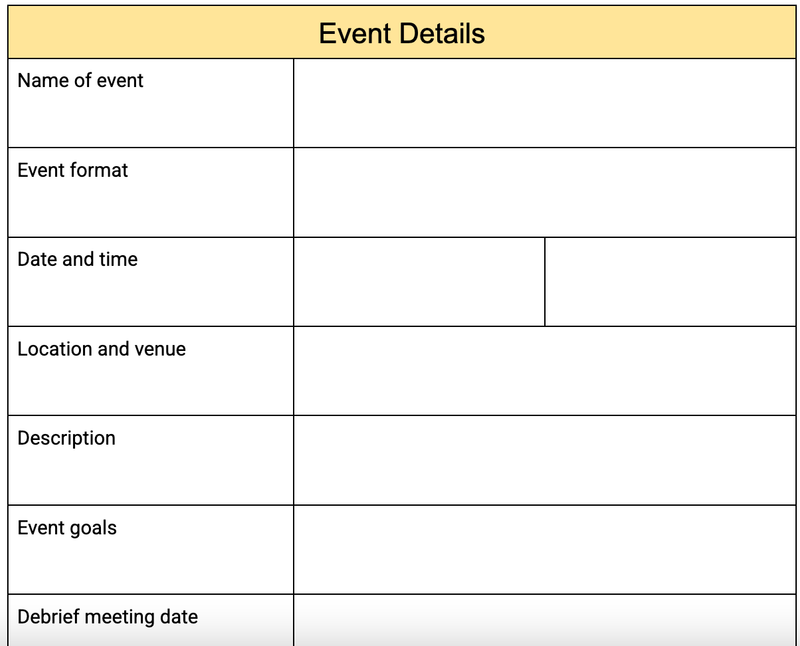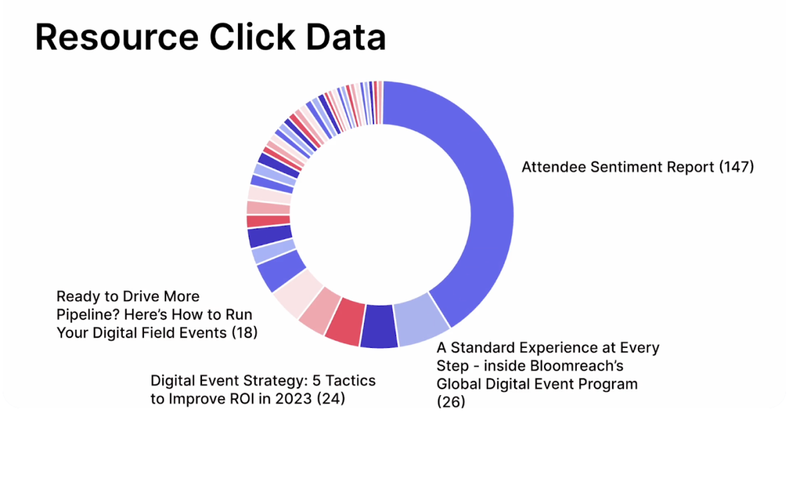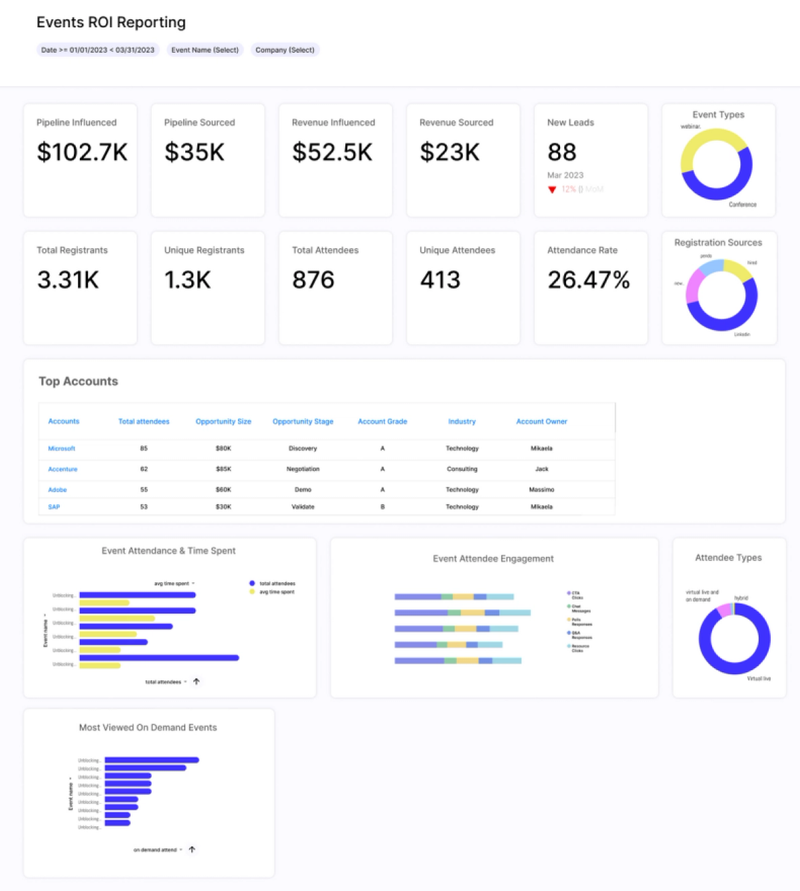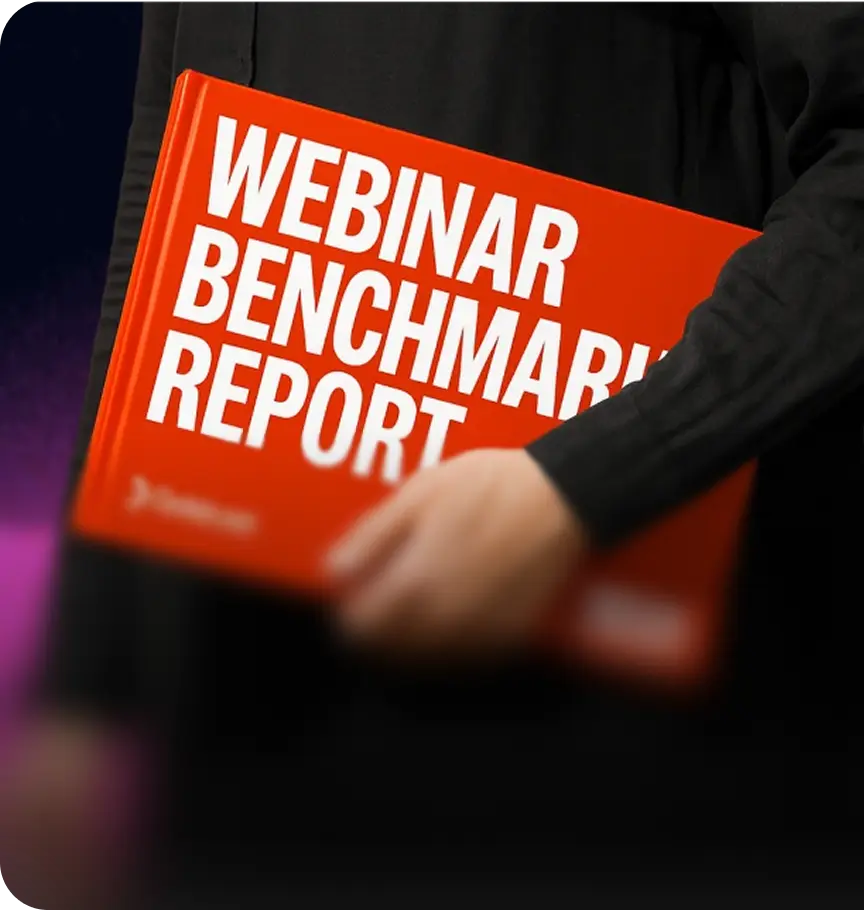Assess Your Event’s Success with a Post-Event Debrief (+ Template)

Table of Contents
Maximize Your Marketing ROI
Join 10,000 other marketers already getting the best tips on running engaging events that boost pipeline and create raving fans.
The big day is over. Your event went off without a hitch.
You can officially breathe a big sigh of relief—but hold up, there's one more thing (we promise it's worth it).
Taking a step back to thoughtfully dissect your event can reveal valuable insights while celebrating the elements of your event that truly knocked it out of the park. This kind of reflection is pure gold—and way too often skipped—especially after you've poured everything into making your event amazing.
What is a post-event debrief?
A post-event debrief (sometimes called a post-mortem or wrap-up) brings your team together to break down what worked and what didn't. The goal is to make your next event even better by capturing key takeaways and lessons learned.
A thorough debrief report documents your findings, conclusions, and recommendations for future events, creating a valuable knowledge base that gets you one step closer to your target event ROI.
Event debrief template
➡️ Here for the template? Download our free customizable event debrief template to streamline your post-event analysis. This template includes sections for:
- Event overview and goals
- ROI and business impact
- Speakers and sessions
- Sponsorship
- Event marketing
- Content
- Gifting and swag
- Technology
- Venue
- Audience feedback
Download the template or save a copy to your Google Drive.

What are the benefits of a post-event debrief?
Look, we get it. After weeks (or months) of planning and prep, asking your team to do "just one more thing" feels like a lot.
But taking a moment to reflect while everything's still fresh? That's how you turn your hard work into a blueprint for success. Plus, your debrief meeting is the perfect opportunity to give props to everyone who made your event shine.
Here's why you definitely do not want to skip the post-event debrief process.
Build on your wins
When you actively review what went well, you're creating a proven playbook for future events. Whether you're scaling your flagship annual conference or launching a webinar series, a well-structured post-event debrief gives you a foundation to build on rather than starting from scratch every time.
Strengthen your team
At the end of the day, your debrief session isn't just about the event itself. It's also about your team.
Your team worked incredibly hard together for weeks or months. This meeting is your chance to reflect, learn, and celebrate your wins. 🙌🏼
When everyone feels heard and valued, you're building a culture where continuous improvement becomes second nature.
Turn challenges into opportunities
Here's the thing: even the most successful events have room to grow. Taking an honest look at what didn't go perfectly isn't about dwelling on mistakes, it's about spotting opportunities to level up. The key is learning to read the signals your target audience gives you.
“Figuring out what additional content can come next really keeps you ahead of the game and drives more attendance to live and on-demand,” explains Matt Bohn, former Senior Manager of Events & Field Marketing at Drata. “Take what you’re learning and actually apply it.”
Try to shift your mindset from seeing low attendee engagement as a failure to viewing it as valuable feedback. When a session has high drop-off rates, that's your audience telling you something important. When polls get lots of responses or certain topics generate tons of chat activity, that's gold.
Your post-event debrief is a launchpad for brainstorming creative solutions that'll make your next event even better. Every challenge is just a future success story waiting to happen.

Essential elements of an effective post-event debrief
The idea of a retrospective or "aftermath debriefing" goes back at least as far as the 1970s when the US Army developed its After-Action Review (AAR).
According to The Wharton School, an effective AAR encourages active discussion around four key questions:
- What was supposed to happen?
- What actually happened?
- Why were there differences?
- What can we learn from this?
Here are the core features of an effective post-event debrief:
1. A clear agenda
Along with your event debrief template, you'll want a loose agenda to keep things on track (and prevent the meeting from going on forever).
Start your debrief meeting strong with these steps:
- Set clear objectives for what you want to accomplish
- Establish ground rules for constructive, honest feedback
- Define who's responsible for what during the meeting
- Create a realistic timeline that allows thorough discussion without dragging on
2. The right set of event debrief questions
Once you've got your timeline down, outline the top event management questions your team needs to tackle.
You can absolutely use our free template for your debrief—but be sure to go through it prior to your meeting to tailor it to your specific event goals and objectives.
At a high level, here are the essential debrief questions you’ll want to cover:
Pre-event planning
- Did our marketing strategy actually drive the registrations we wanted?
- Were our event registration targets realistic (or were we being way too optimistic)?
- How clearly did we communicate event details to attendees?
Event execution
- Which sessions had people genuinely engaged?
- What technical hiccups happened, and how fast did we fix them?
- How did our speakers and moderators perform?
Attendee experience
- What are people actually saying in the post-event survey?
- What were attendee satisfaction numbers?
- Did networking opportunities feel natural and valuable?
- Would attendees recommend this event to colleagues?
Business outcomes
- Did we hit our lead generation and pipeline goals?
- What was our actual ROI compared to what we projected?
- How many qualified leads did we generate?
With the right set of event debrief questions, you can pinpoint exactly which strategies need tweaking before your next event.
3. Detailed event analytics
Once you have your list of questions ready, make sure you have the post-event data you need to answer them.
By analyzing your core key performance indicators (KPIs) and event metrics, you and your team can discover which sessions actually drove engagement, which sponsor booths attracted quality prospects, and which attendees became valuable leads.
“For every dollar in, you’ve got to have a clear return,” insists Tifenn Dano Kwan, CMO at Amplitude. “If the return is not there, then you need to rethink your marketing mix.”
Your event data analysis should not just celebrate attendance, but dig into whether your events are creating profitable growth.
Update your event debrief template to compare expected vs. actual results in these key areas:
- Registration and attendance rates
- Session engagement and drop-off rates
- Lead quality and conversion metrics
- Social media reach and engagement
- Sponsor satisfaction and booth traffic
- Revenue generated (if applicable)
If you're using a digital event platform with deep attendee analytics, you should be able to visualize your post-event data in a customizable dashboard. (We really hope you’re not manually wrangling data in Excel. 🫥)
Goldcast’s virtual event platform integrates directly with your martech stack so you can debrief on all your metrics in one place. Book a demo to see it in action.

4. A clear plan of action
Data and insights are great, but without action, they're just numbers on a page.
After your event, you need a seamless handoff of actionable event data and attendee insights to your sales team. You might also want to tackle priorities like video content repurposing, creating messaging for other marketing channels, and personalizing your sales follow-up emails.
Make sure everyone knows exactly what to do and when:
- Assign specific action items with realistic deadlines
- Prioritize improvements based on impact and effort required
- Schedule follow-up meetings to track progress
- Document decisions and changes to implement for future events
5. Debrief report
Your debrief report is the official record of your event's performance and the wisdom you've gained. This written summary captures everything discussed during your debrief meeting—no important insights left behind.
Include these sections in your debrief report:
- Executive summary of event performance
- Detailed breakdown of successes and challenges
- Attendee feedback and satisfaction scores
- Financial performance and ROI analysis
- Specific recommendations for future events
- Action items with clear owners and timelines
Pro tip: Use Google Docs or a similar collaborative platform for your event report so everyone can contribute insights and stay in the loop.
Here’s the link to our free event debrief template one more time so you don’t have to scroll back up. 💁🏼♀️
How to use the event debrief template in an effective event debrief meeting
The event debrief template is your roadmap to a productive, insightful team discussion. Here's how to make it work:
Before the meeting:
- Share the template with participants at least 24 hours ahead of time
- Ask team members to review relevant sections and come prepared
- Gather all necessary data, analytics, and attendee feedback
- Set clear expectations for meeting duration and goals
During the meeting:
- Use the template as your meeting agenda, working through each section systematically
- Encourage honest, constructive feedback from everyone
- Fill out insights and action items directly in the template as you go
- Reference specific metrics and data points when discussing performance
- Make sure every team member gets a chance to share their perspective
After the meeting:
- Finalize the completed template within 48 hours while everything's fresh
- Share the final debrief report with all stakeholders
- Set up reminders for action items and deadlines
- Save the template for future reference and comparison
The secret to a successful debrief meeting is treating your template as a living document that guides discussion while capturing valuable insights you'll actually use.
A successful event doesn't happen overnight
Great events are built on the lessons from all the events that came before—both the wins and the learning experiences. The question is: Are you actually learning as you go?
With Goldcast, you get robust data analytics that make it easy to visualize how different aspects of your events impact your revenue pipeline. After your event wraps up, use Content Lab to transform your best moments into videos, blog posts, and more.
When you take time to understand why things went the way they did, you get a complete view of your event process. And with the right platform, you have everything you need to make that process even more efficient.
Discover how Goldcast can streamline your entire event workflow from planning to post-event analysis. Book a demo today.
Transform Your Video Marketing with AI
Stay In Touch
Platform
Resources
Company
© 2026 Copyright Goldcast, Inc. All rights reserved.
YOUR PRIVACY CHOICES




 Upcoming Events
Upcoming Events Event Series
Event Series On-Demand Events
On-Demand Events

